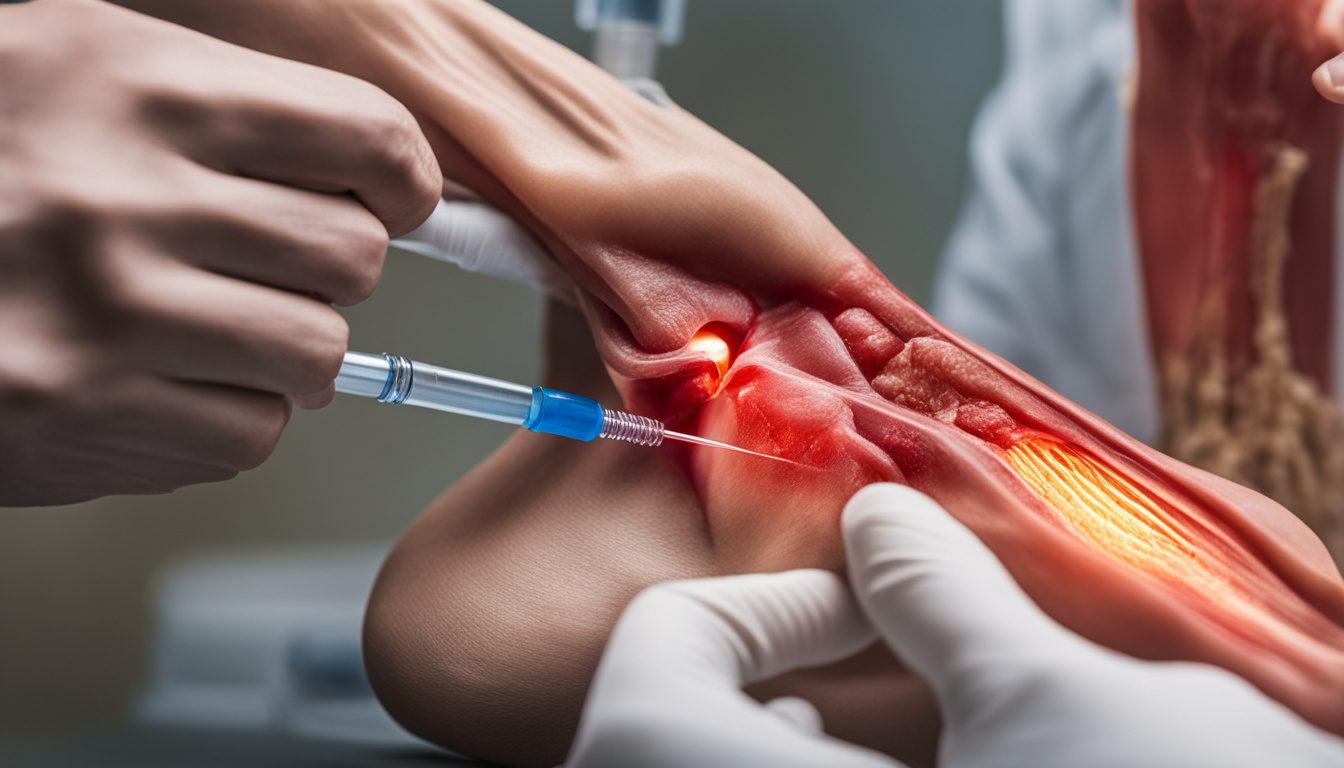Tendinitis Achilles, or Achilles tendonitis, is a common problem. It happens when the Achilles tendon gets overused. This tendon links the calf muscles to the heel bone. It can make the back of your heel hurt, swell, and feel stiff. This makes moving around and sports tough.
Many things can lead to Tendinitis Achilles. Doing too much, like sports or running, is a big reason. So is starting or increasing exercise too quickly. And not using the right shoes. Your age, family history, and other health problems can also increase your risk.
To diagnose Tendinitis Achilles, the doctor will check your heel and may order tests. An MRI or ultrasound can give detailed pictures. These help understand how bad the injury is and if there are other problems.
Doctors have different ways to help with Tendinitis Achilles. Simple ideas like resting, using ice, and doing specific exercises can work. Sometimes, more advanced options like stem cell therapy are chosen.
Stem cell therapy offers new hope. It can help heal the tendon and lower pain. Doctors put stem cells right into the sore spot. This helps fix the damage and grow new, healthy tendon cells.
Key Takeaways:
- Tendinitis Achilles causes pain and problems in the back of the heel due to overuse.
- Besides overuse, not wearing the right shoes and age, genetics, and health issues can also cause it.
- The doctor checks your heel and might do tests like an MRI to find out what’s wrong.
- There are many ways to treat it, from simple methods like resting and icing to new treatments like stem cells.
- Stem cell therapy is showing good results in helping the tendon heal and making the pain go away.
Symptoms of Tendinitis Achilles
Tendinitis Achilles, or Achilles tendonitis, mainly affects the back of the heel. It causes various symptoms like:
- Achilles tendon pain: People with Tendinitis Achilles usually feel pain in their Achilles tendon. This pain can be mild or severe. It gets worse with activity and is also felt when walking or running.
- Achilles tendon stiffness: Another common sign is stiffness in the Achilles tendon. It makes moving the ankle hard. Also, it leads to discomfort and limits how far you can move your ankle.
- Swelling in Achilles tendon: The Achilles tendon may get swollen and inflamed. This swelling adds to the feeling of tightness and discomfort in the heel’s back.
Moreover, tenderness can occur in the sore area. The Achilles tendon could feel sore to touch. You might also feel a grating noise or cracking sensation when moving your ankle. For some, morning stiffness in the Achilles tendon makes starting the day difficult.
If you suddenly feel pain, see swelling, or notice bruising in the heel or calf, it could be a sign of Achilles tendon tear or rupture. In these cases, it is crucial to get medical help right away. This helps prevent more damage and gets the right treatment.
| Symptoms | Description |
|---|---|
| Achilles tendon pain | Pain in the Achilles tendon that worsens with activity and can be present when walking or running. |
| Achilles tendon stiffness | Stiffness in the Achilles tendon, making it difficult to move the ankle freely. |
| Swelling in Achilles tendon | Inflammation and swelling in the Achilles tendon area. |
| Tenderness | The affected area of the Achilles tendon may feel tender to the touch. |
| Grating noise or cracking feeling | A grating noise or cracking feeling may occur when moving the ankle. |
| Morning stiffness | Some individuals may experience stiffness in the Achilles tendon in the morning. |
Causes and Risk Factors of Tendinitis Achilles
Tendinitis Achilles, also known as Achilles tendonitis, can happen for many reasons. Knowing what causes and raises the risk of this issue is important for keeping it at bay.
Causes
- Overuse: Activities like running or jumping that stress the Achilles tendon can cause overuse injuries.
- Inadequate footwear: Not wearing supportive or well-fitting shoes can up your Tendinitis Achilles risk.
- Age: The Achilles tendon becomes less flexible and more injury-prone with age.
- Genetic factors: Some people are genetically more likely to get Achilles tendonitis.
- Underlying medical conditions: Health issues like high cholesterol, diabetes, and arthritis could also increase your chances.
- Medication: Certain drugs, including corticosteroids and fluoroquinolones, can raise your injury risk.
Risk Factors
These are other things that can make Tendinitis Achilles more likely:
- Athletes and sports: Sports that strain the Achilles tendon put athletes at a higher risk.
- Previous tendon injury: A history of tendon issues makes Tendinitis Achilles more probable.
- Improper training: Bad training methods, like too much, too soon, or the wrong kind of training, can be a risk factor.
- Flat feet or high arches: The shape of your feet can also play a part in getting Achilles tendonitis.
- Obesity: More weight means more stress on the Achilles tendon, which can lead to injury.
Knowing what causes Tendinitis Achilles and its risk factors can help you lower your chances. This way, you can keep your Achilles tendon safe from harm.
Stem Cell Therapy for Tendinitis Achilles – A Promising Treatment Option
Stem cell therapy is an innovative approach for those with Tendinitis Achilles. It aims to heal tendons and ease pain from Achilles tendon injury. The process involves injecting stem cells, which can be from the patient or a donor, into the injured area.
Stem cells can turn into tendon cells. This helps in repairing damage and grows new, healthy tendon cells. Many studies show the therapy works well for different tendon injuries.
This therapy is less invasive than surgery, making for a quicker recovery. Plus, it leads to better healing for those with Tendinitis Achilles. Patients can get treated and go home the same day, which is more convenient. Always talk to a doctor to see if this therapy is right for you.

